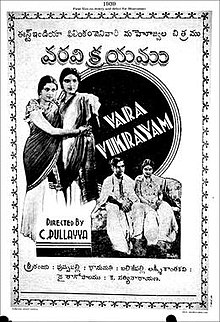
Missamma is a 1955 Indian Telugu-language romantic comedy film directed by L. V. Prasad. It was produced by Nagi Reddi and Chakrapani on Vijaya Productions banner. The film stars N. T. Rama Rao, Savitri, Akkineni Nageswara Rao and Jamuna. The script was adapted by Chakrapani from Rabindranath Maitra's Bengali play Manmoyee Girls' School. It revolves around two unemployed people — M. T. Rao and Mary — who pose as a married couple to obtain employment in a high school founded by Gopalam, a zamindar. As Rao and Mary fall in love, Gopalam's nephew A. K. Raju learns that Mary is Gopalam's missing elder daughter Mahalakshmi; she is unaware of her true identity.

P. Bhanumathi Ramakrishna was an Indian actress, singer, film producer, director, music composer, and novelist. She is regarded as the first female super star of Telugu cinema. She is also considered the first female director of Telugu cinema with her debut directorial Chandirani (1953). Bhanumathi appeared in over 100 films predominantly in Telugu and Tamil languages. She was awarded the Padma Bhushan in 2001 for her contribution to the Indian cinema. She was honored among "women in cinema" at the 30th International Film Festival of India.

Naa Alludu is a 2005 Indian Telugu-language action comedy film directed by Vara Mullapudi from a story written by V. Vijayendra Prasad. The film stars Jr. NTR, Ramya Krishna, Shriya, and Genelia while Suman, Rajiv Kanakala, Charan Raj, Brahmanandam, and Ali play supporting roles. The film was a Box-office bomb.
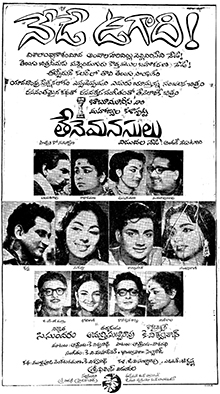
Thene Manasulu is a 1965 Indian Telugu-language romance film directed by Adurthi Subba Rao and written by Mullapudi Venkata Ramana. The film stars Krishna, Ram Mohan, Sandhya Rani and Sukanya. It revolves around a young girl (Sukanya) who falls in love with a man (Krishna), not realising that he is the same man her marriage was initially fixed with. Thene Manasulu is based on K. R. K. Mohan's novel Vakrinchina Sarala Rekhalu.
Balijepalli Lakshmikantha Kavi was an Indian playwright, novelist, poet, screenwriter, actor and freedom fighter. He is remembered for the magnum opus Satya Harischandriyamu, a play written in 1924, and for his works in Telugu cinema.

Bendu Apparao R.M.P is a 2009 Indian Telugu-language romantic comedy film written and directed by E V V Satyanarayana, and produced by D. Ramanaidu. The film Allari Naresh, Kamna Jethmalani and Meghana Raj in lead roles. It has music composed by Koti.
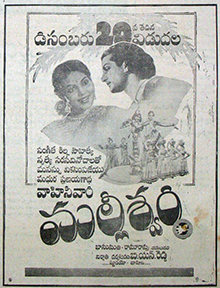
Mallishwari is a 1951 Indian Telugu-language historical romance film produced and directed by B. N. Reddy under his banner Vauhini Studios. N. T. Rama Rao and P. Bhanumathi star as a couple – Nagaraju and Mallishwari
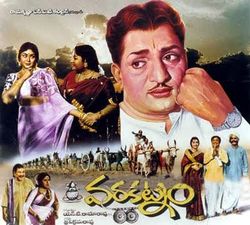
Varakatnam (transl. Dowry) is a 1969 Indian Telugu-language drama film, produced by N. Trivikrama Rao under the banner Ramakrishna & NAT Combines and directed by his older brother N. T. Rama Rao. It stars Rama Rao, Savitri and Krishna Kumari, with music composed by T. V. Raju. The film won the National Film Award for Best Feature Film in Telugu.

Dharma Patni or Dharmapatni is a 1941 Indian Telugu-language drama film produced and directed by P. Pullayya under the Famous Films banner. It stars Santha Kumari, Bhanumathi, Uppuluri Hanumantha Rao and C. Hemalatha. The film marks the debut of Akkineni Nageswara Rao, who played a minor role as one of the ten school children in a song sequence, and also that of the writer Chakrapani.

Chittajallu Pullayya was an Indian film director and screenwriter. He is one of the earliest film personalities in Telugu cinema being associated with the industry right from the silent era.
Koccharlakota Satyanarayana was a Telugu film and drama actor and playback singer during the early period of Telugu cinema.

Tikka Sankarayya is a 1968 Indian Telugu-language comedy film directed by D. Yoganand and produced by D. V. S. Raju. It stars N. T. Rama Rao, Krishna Kumari and Jayalalithaa, with music composed by T. V. Raju.
Vara Vikrayam is a famous novel and play with same name by Kallakoori Narayana Rao. It is based on a reformist social theme about the Dowry system prevalent in India.

Babai Abbai is a 1985 Indian Telugu-language comedy film written and directed by Jandhyala. It stars Nandamuri Balakrishna and Anitha Reddy, with music composed by Chakravarthy. The film is inspired by the Telugu film Vaddante Dabbu (1954), which itself was based on the English novel Brewster's Millions (1902) by George Barr McCutcheon.

Kasturi Siva Rao was an Indian actor, comedian, playback singer, producer and director known for his works in Telugu cinema. He was one of the first star comedians of Telugu cinema.

Missiamma is a 1955 Indian Tamil-language romantic comedy film directed by L. V. Prasad. Produced by B. Nagi Reddy and Aluri Chakrapani's Vijaya Vauhini Studios, the script was adapted by Chakrapani from the Bengali novel Manmoyee Girls School by Rabindranath Maitra. Missiamma also focused on social issues such as unemployment, corruption, and freedom of worship. Missiamma tells the story of two unemployed people of different religions and mentalities: Balu and Mary. They pose as a married couple to obtain jobs in a high school founded by Gopal, the zamindar of Aandipettai. As Balu and Mary fall in love, Gopal's nephew Raju learns that Mary is Gopal's missing elder daughter Mahalakshmi; she is unaware of her true identity.
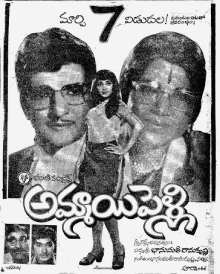
Ammayi Pelli is a 1974 Indian Telugu-language comedy film, produced and directed by Bhanumathi Ramakrishna under the Bharani Pictures banner. It starsN. T. Rama Rao, Bhanumathi Ramakrishna with music also composed by Bhanumathi Ramakrishna in association with Satyam.

Thodu Needa is a 1965 Indian Telugu-language drama film written and directed by Adurthi Subba Rao. The film stars N. T. Rama Rao, Bhanumathi and Jamuna, with music composed by K. V. Mahadevan. It is a remake of the Tamil film Karpagam (1963). The film was released on 12 May 1965, and emerged a commercial success.

Vivaha Bandham is a 1964 Indian Telugu-language drama film, produced and directed by P. S. Ramakrishna Rao of Bharani Pictures. The film stars N. T. Rama Rao, Bhanumathi Ramakrishna with music composed by M. B. Sreenivasan, while Bhanumathi has taken care of supervision. It is a remake of the Bengali film Saat Pake Bandha (1963).
Dasari Kotiratnam was an Indian actress, singer, and film producer. She was the first female producer of Telugu cinema. She was also the first actress to set up a theatre group in Andhra. Her career as a theatre actor spanned over four decades.
